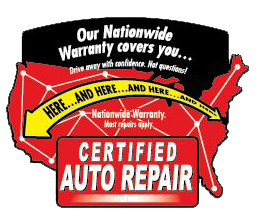
AUTONET TV
Archive for September 2020Hold the Oil! (Oil Pan Gasket Replacement)Posted September 27, 2020 4:01 AMYou've likely heard how important oil is to your vehicle's engine. Did you know that there's one part that's responsible for holding that oil so you can use it every day? It's called the oil pan, and it sits at the bottom of the engine. The oil pan is a vital, though simple, part of your engine's lubrication system. Oil circulates through parts of your engine to keep them lubricated. It reduces friction so everything works smoothly. Without oil, friction would quickly destroy your engine. The oil pan keeps that oil contained in the lubrication system, so it's important that the oil doesn't leak out. Since it's a metal part attached to another metal part, there is a gasket between the oil pan and the part of the engine it attaches to. Various things can put stress on the oil pan and gasket, including weather extremes, the speed you're traveling and the condition of the oil. You may drive over a couple of bad roads and kick up debris onto your oil pan. All this wear and tear, heat and time can take their toll. So after a while, the gasket can just wear out and start leaking. It usually starts pretty slowly. If you see oil visible under your vehicle where you park it, that might be a sign of a leaky oil pan gasket. Another sign? You smell burning oil coming from your engine. If the leak is bad and your engine has lost a lot of oil, you may eventually see the oil light go on. Let your service advisor know if you are experiencing any of these things. Driving with insufficient oil can badly damage your engine. And it can do it quickly. A East Coast Automotive Services trained technician will check to find the source of the leak. It may just be a gasket, but it also could be the oil pan is damaged and needs replacing as well. This is a repair you should get taken care of. Your engine needs its lubrication system intact to provide you many years of service. East Coast Automotive Services Battery Replacement for Your vehiclePosted September 20, 2020 8:51 AMModern vehicles in and around Jupiter run on 12 volt electrical systems. 12 volts is enough to get the job done for Jupiter drivers without having so much power that there is danger of electrocution. But today's vehicles have more electrical components and do-dads than ever before. This really strains your electrical system, making it hard for the battery to keep up. Think about it: electric seats, seat heaters, power locks windows and sun roofs. And then us FL drivers have all the power outlets for our cell phones, computers and DVD players. East Coast Automotive Services
The Right Oil for the Season (Engine Oil Viscosity)Posted September 18, 2020 8:45 AMAs the temperatures plunge, certain types of engine oil may not flow as easily as they did when it was warmer. Makes sense, doesn't it? Just like molasses gets thicker as the temperature goes down, engine oil does the same thing. So, maybe you're wondering if you have to change your oil as the seasons change so it's just the right thickness to lubricate your engine parts. How well engine oil flows is called its viscosity. There are different types of oil—some that have just one viscosity and others called "multigrade" oils. Here's the difference. A single viscosity oil will flow better when it's hot but not as well when it's cold. A multigrade oil is engineered so that its flow properties at cold temperatures are different than they are at warm temperatures. In other words, a multigrade oil can start out in colder temperatures acting like a thinner oil and then behave like a thicker oil when it's warm. That's a pretty cool trick and it's why multigrade engine oil is used in nearly all vehicles. Your vehicle's manufacturer has the correct viscosity of oil for your particular model included in the owner's manual. Another choice you have to make when it comes to engine oil is whether you use conventional oil, synthetic oil or a blend of the two. Synthetic oils have some advantages over conventional, such as resisting breakdown better and withstanding higher temperatures. Check with your service advisor to see which viscosity and type of oil is recommended for your vehicle. It's important that in cold weather, the oil flows through your engine at the right thickness so that parts are being properly lubricated. That will make sure you'll get good fuel economy and performance, no matter what the temperature is.
East Coast Automotive Services Maintenance Tips: The Belt Goes OnPosted September 18, 2020 8:45 AM
The serpentine belt may also run the pumps for both the power steering and power brakes. And on many vehicles, the serpentine belt powers the water pump. The water pump circulates coolant through the engine to keep it within normal operating temperatures. (On some vehicles, the water pump is powered by the timing belt instead of the serpentine belt.) So you can see the serpentine belt does a lot of work. And it if breaks, it affects a lot of systems. That's why your vehicle manufacturer and your service advisor at East Coast Automotive Services have recommended that it be changed every so often so that it doesn't fail. East Coast Automotive Services Fuel Injection: It Keeps Getting Better for Jupiter DriversPosted September 18, 2020 8:45 AMJupiter residents know that engines need to burn fuel to operate. Fuel is pumped from your fuel tank to your vehicle engine where it is squirted—or injected—into your engine's cylinders. This is the function of the fuel injectors. Contact us for more tips to help you improve your performance and safety. East Coast Automotive Services East Coast Automotive Services Fuel Saving Tip for Jupiter: Check Engine LightPosted September 18, 2020 8:45 AMHere's a question for Jupiter, FL : How long have you been enjoying the romantic glow of your Check Engine light? Many conditions that trigger the Check Engine light can hurt your vehicle. A lot. East Coast Automotive Services The Key Won't Turn! (Ignition Problems)Posted September 18, 2020 8:45 AMYou've just arrived at the store shopping and you're ready to head home. You put your key in the ignition and… oh, no! The ignition won't turn! What do you do now? Don't panic. There are some things you can do to get going again. The first thing to do is see if you have a locking steering wheel, an anti-theft feature that was introduced around 1970. Sometimes it sticks. Move the steering wheel side to side while you try to turn the key and you might be able to get it to release. Another thing to check is to see if your vehicle is in gear. Most vehicles will only allow you to start the ignition if it's in park or neutral. If you have an automatic transmission vehicle and it is in park, try jiggling the shift lever and try the key again. Sometimes the safety mechanism doesn't properly make contact or gets a little sloppy. If both of these don't work, it could be your vehicle's battery is dead. Some newer electronic systems require power so the key can turn. Others have alarm systems that detect if doors are open. Other issues that can cause key problems include something jammed in the lock cylinder. Or some of the springs or pins inside may be stuck. Consider that it may be the key itself. Sometimes they get bent or simply wear out from the number of times they've been put in and taken out of the cylinder. No matter what the cause, the first time this happens you should have your repair service facility check it out. That’s because if it happens once, it can happen again. Even if you were able to get going again on your own, your ignition/key has warned you that something's wrong. Have it checked out by a pro so you’re not locked into a bad situation. East Coast Automotive Services Maintaining Your Older Car in Jupiter, FLPosted September 18, 2020 8:45 AM
East Coast Automotive Services Steer Me Right! (Failing Power Steering Hose)Posted September 18, 2020 8:45 AMMost drivers love how easy it is to turn their vehicles, and they have power steering to thank. Engineers have figured out a way to take some of your engine's power to help you turn. Without it, steering can be quite a chore. New power systems are electric, but there are still plenty of the older hydraulic power steering systems out there, and it's wise to keep them working the way they should so you don't find yourself stranded without power steering. Those hydraulic power systems use a fluid under pressure that is pumped to a device that helps you turn your wheels more easily. It's that pressure that presents the challenge. After your vehicle's seen a few years on the road, you may find your steering isn't quite as easy as it was. You may hear a groaning or humming sound when you turn. One component that can fail is the pressure hose that carries that fluid from the power steering pump to that turning assist mechanism. The hose is made of rubber and can leak, crack, get damaged by heat and debris or just get too old. If yours is ten years old or older, it's likely getting close to the end of its life. If you think you can just wait until it fails completely, think of these possible consequences. If the hose or a coupling fails, power steering fluid can blow all over the hot engine. That fluid is flammable and can start a fire. Or if you've been driving for a few weeks with low power steering fluid, that could ruin your power steering pump. Replacing the pump is an extra expense you can probably live without. A technician will replace the necessary parts and make sure air and contaminants are bled or flushed from the system. Then, he or she will check for leaks. Just think how important a properly working power steering system is for safe operation of your vehicle. Make sure you keep yours in top shape for your safety's sake and the safety of others on the road around you. East Coast Automotive Services The Right Oil for the Season (Engine Oil Viscosity)Posted September 18, 2020 8:45 AMAs the temperatures plunge, certain types of engine oil may not flow as easily as they did when it was warmer. Makes sense, doesn't it? Just like molasses gets thicker as the temperature goes down, engine oil does the same thing. So, maybe you're wondering if you have to change your oil as the seasons change so it's just the right thickness to lubricate your engine parts. How well engine oil flows is called its viscosity. There are different types of oil—some that have just one viscosity and others called "multigrade" oils. Here's the difference. A single viscosity oil will flow better when it's hot but not as well when it's cold. A multigrade oil is engineered so that its flow properties at cold temperatures are different than they are at warm temperatures. In other words, a multigrade oil can start out in colder temperatures acting like a thinner oil and then behave like a thicker oil when it's warm. That's a pretty cool trick and it's why multigrade engine oil is used in nearly all vehicles. Your vehicle's manufacturer has the correct viscosity of oil for your particular model included in the owner's manual. Another choice you have to make when it comes to engine oil is whether you use conventional oil, synthetic oil or a blend of the two. Synthetic oils have some advantages over conventional, such as resisting breakdown better and withstanding higher temperatures. Check with your service advisor to see which viscosity and type of oil is recommended for your vehicle. It's important that in cold weather, the oil flows through your engine at the right thickness so that parts are being properly lubricated. That will make sure you'll get good fuel economy and performance, no matter what the temperature is.
| ||
SearchArchiveSeptember 2020 (17)October 2020 (4) November 2020 (5) December 2020 (4) January 2021 (6) February 2021 (4) March 2021 (4) April 2021 (4) May 2021 (5) June 2021 (4) July 2021 (4) August 2021 (5) September 2021 (4) October 2021 (5) November 2021 (4) December 2021 (4) January 2022 (6) February 2022 (4) March 2022 (4) April 2022 (4) May 2022 (5) June 2022 (4) July 2022 (5) August 2022 (4) September 2022 (4) October 2022 (5) November 2022 (4) December 2022 (4) January 2023 (5) February 2023 (4) March 2023 (4) April 2023 (5) May 2023 (4) June 2023 (4) July 2023 (5) August 2023 (4) September 2023 (4) October 2023 (5) November 2023 (4) December 2023 (5) January 2024 (5) February 2024 (4) March 2024 (5) April 2024 (4) May 2024 (3) | CategoriesFuel System (21)Drive Train (5)Maintenance (16)Shocks & Struts (4)Auto Safety (5)Safety (2)Transmission (2)Oil Change (3)Steering (5)What Customers Should Know (26)Check Engine Light (1)Battery (8)Fuel Saving Tip: Slow Down (2)Alignment (5)Tires and Wheels (17)Fuel Economy (7)Parts (2)Winter Prep (2)Fluids (6)Cabin Air Filter (3)Cooling System (7)Timing Belt (2)Brakes (11)Service Intervals (1)Diagnostics (2)Inspection (3)Automotive News (4)Tire Rotation and Balancing (1)Service Standards (3)Exhaust (5)Monitoring System (3)Windshield Wipers (2)Air Conditioning (4)Tires (3)Alternator (3)TPMS (3)Older Vehicles (1)Differential Service (1)Keys to a long lasting vehicle (3)Water Pump (1)Trip Inspection (1)Wheel Bearings (1)Fuel Pump (1)Suspension (1) | |

OUR REVIEWS


Matthew Stevens, 05/16/2024Jeanine , Steve and the team are always fair. They communicate well and upfront. Also have specials to help save the customer some here and there is always nice. Good service and trustworthy.


 All Jupiter service advisors know that without the alternator, the battery will go dead in a few miles.
All Jupiter service advisors know that without the alternator, the battery will go dead in a few miles.




